#Halifax riot
Text

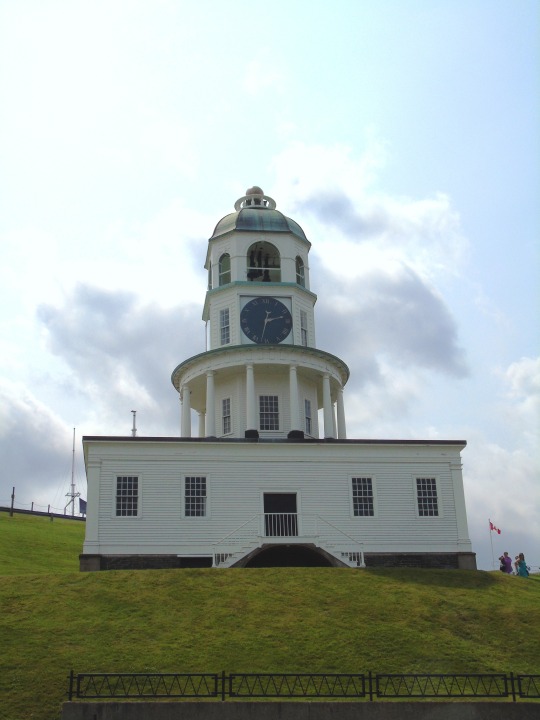
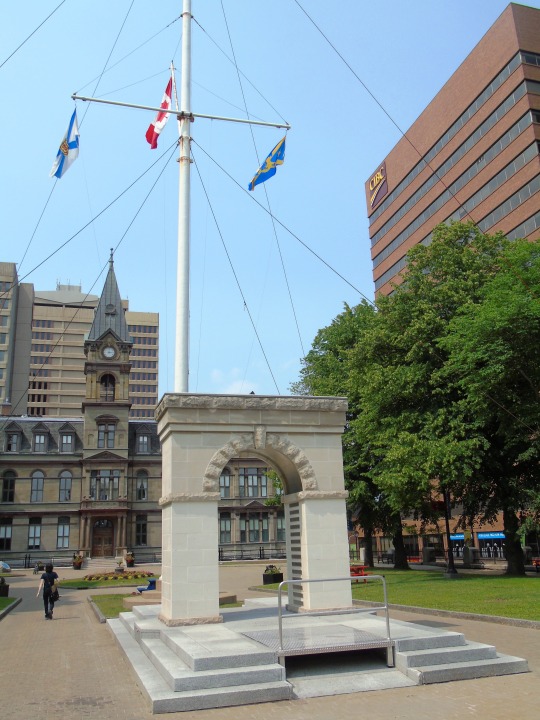
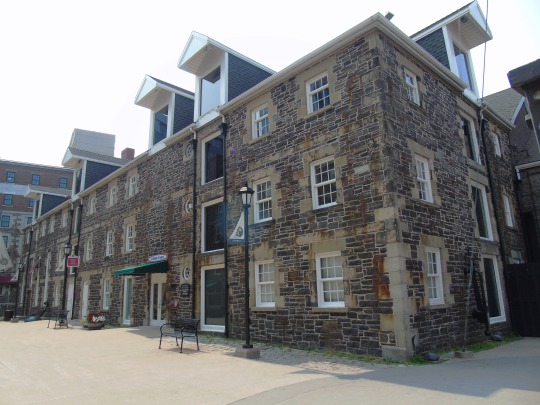
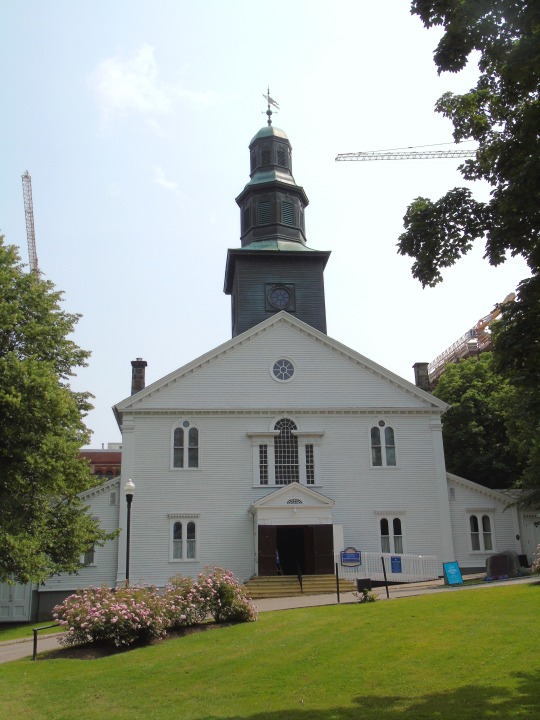

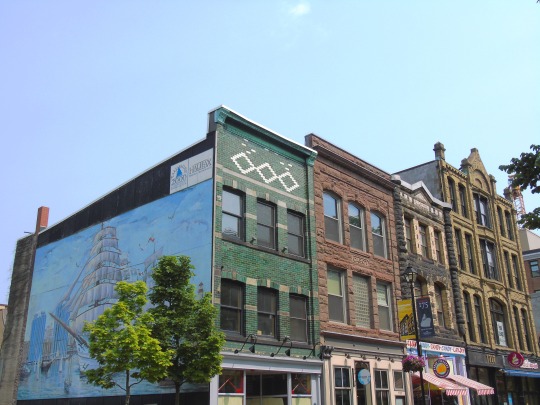
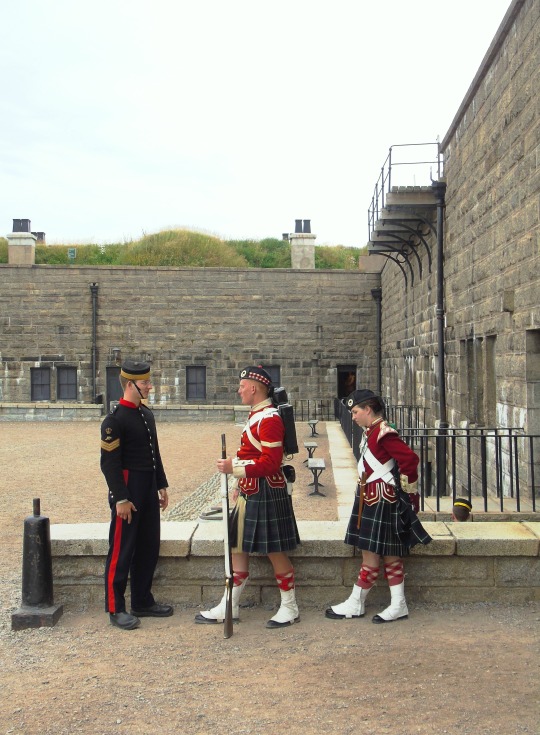
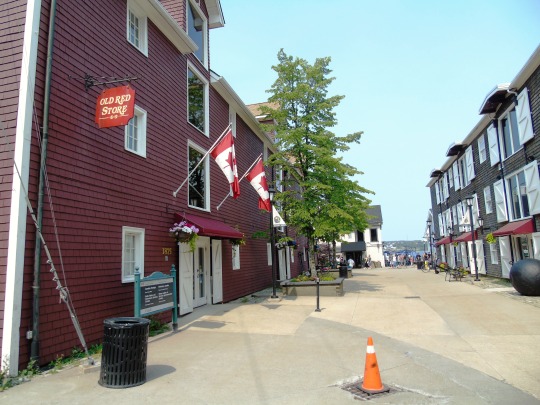
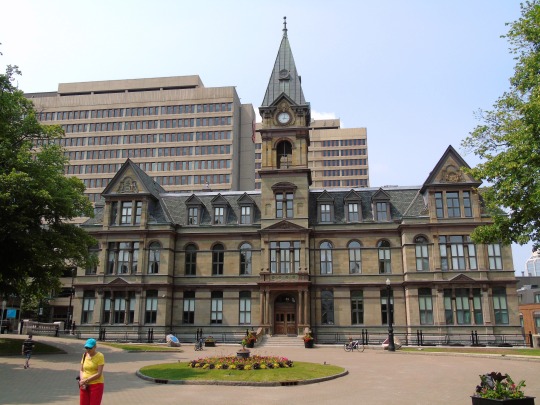

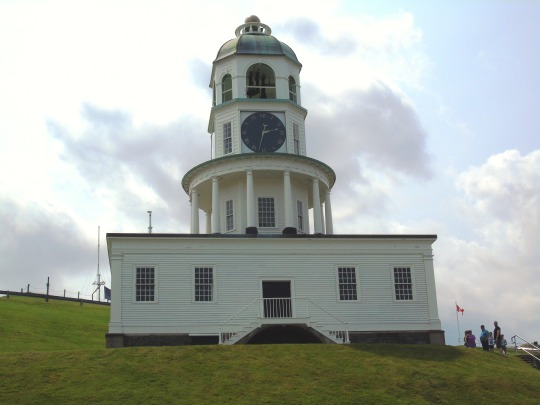
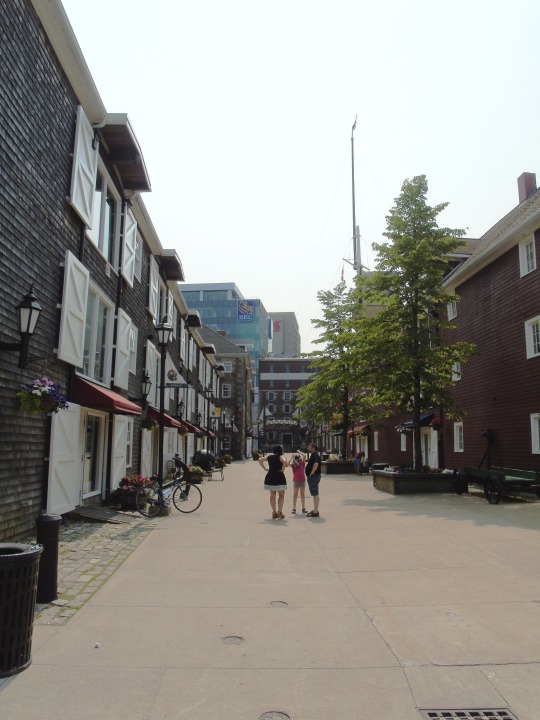
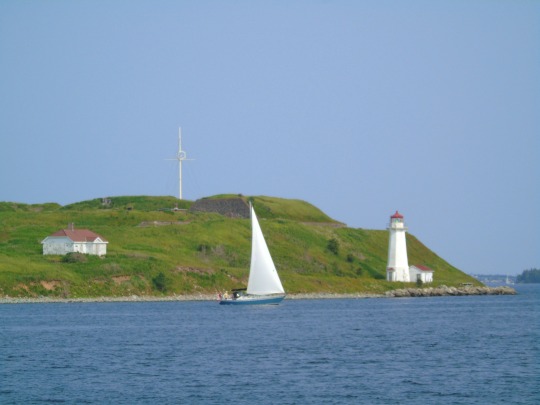
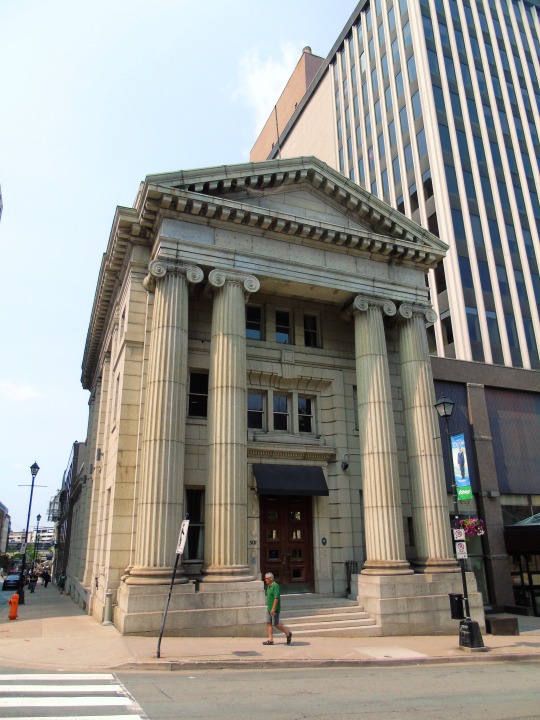

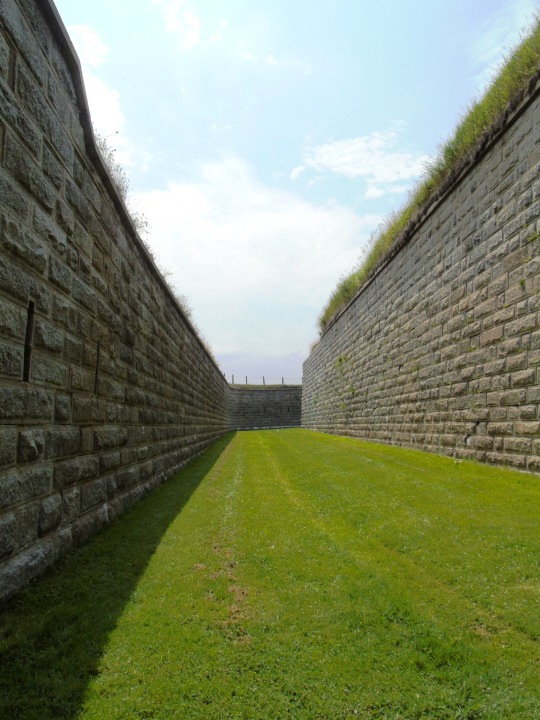
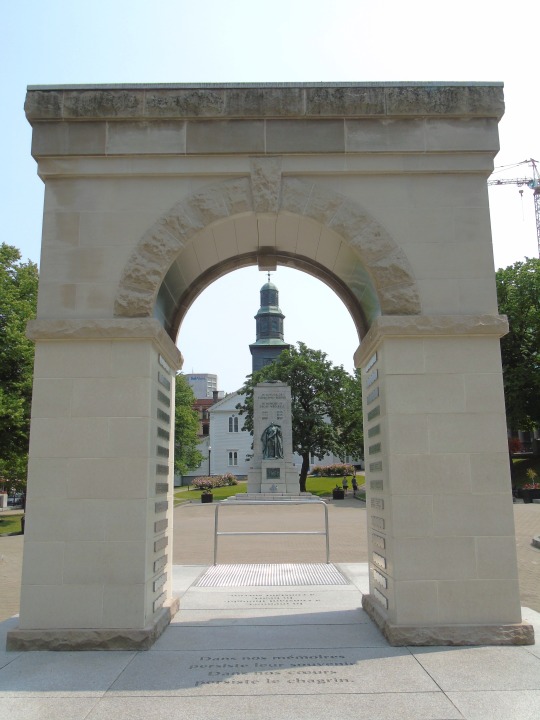
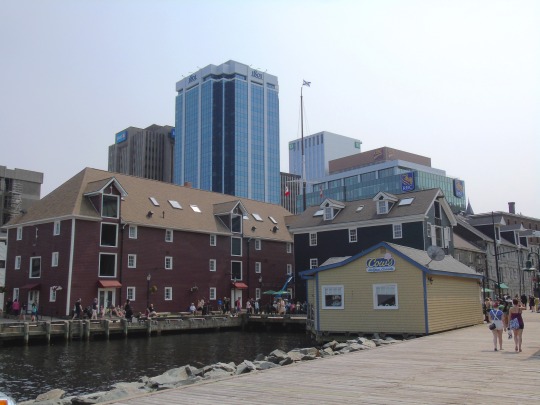
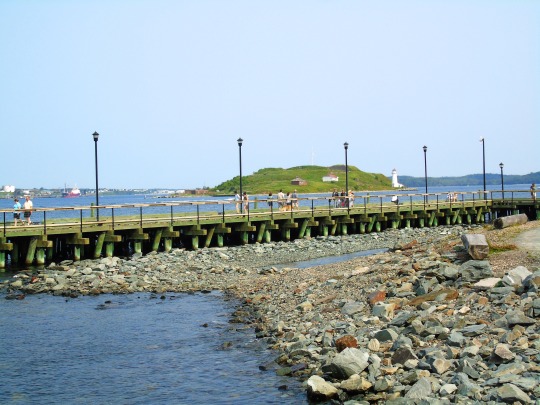
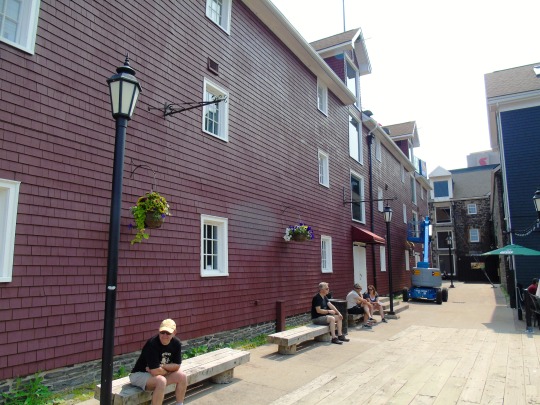
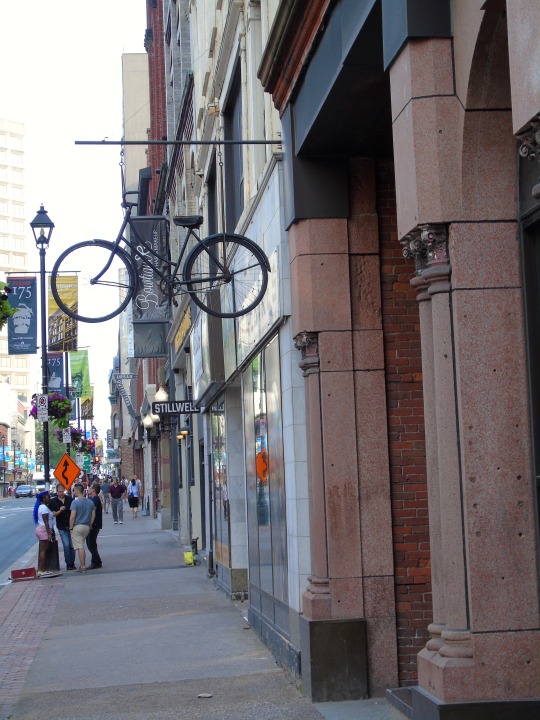
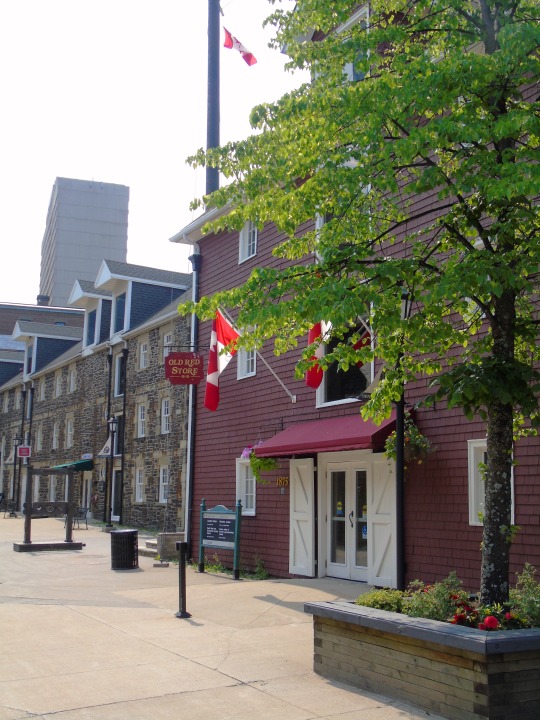
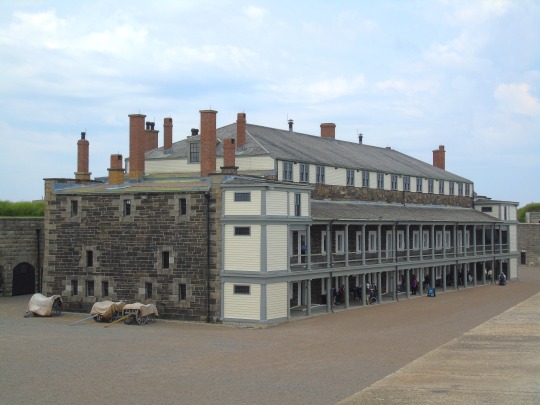
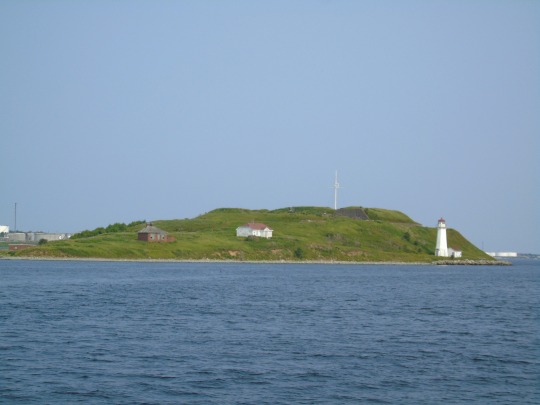
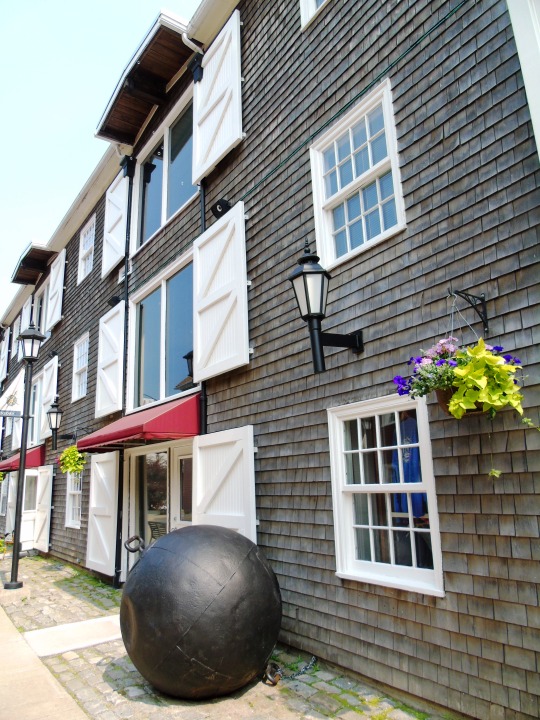
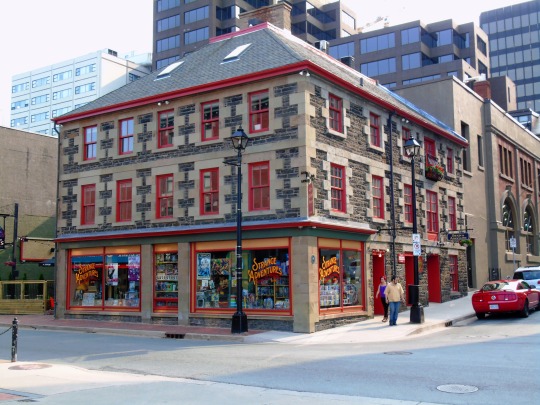
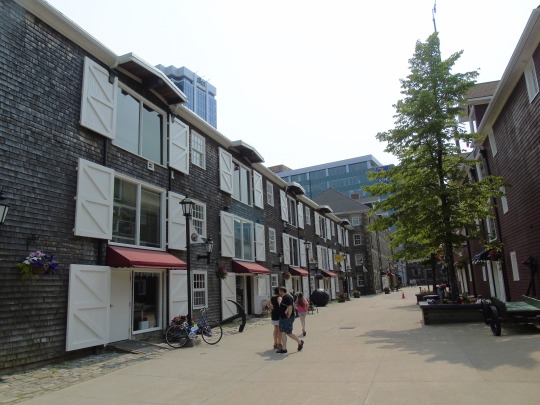
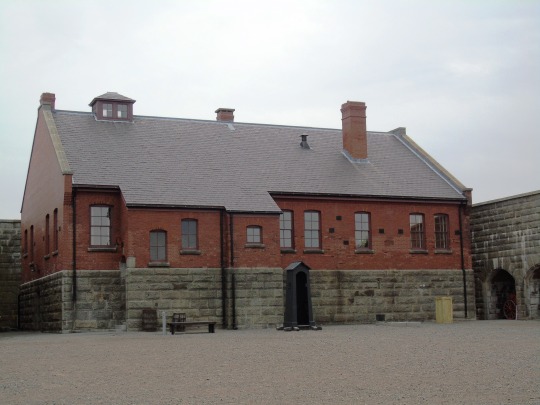
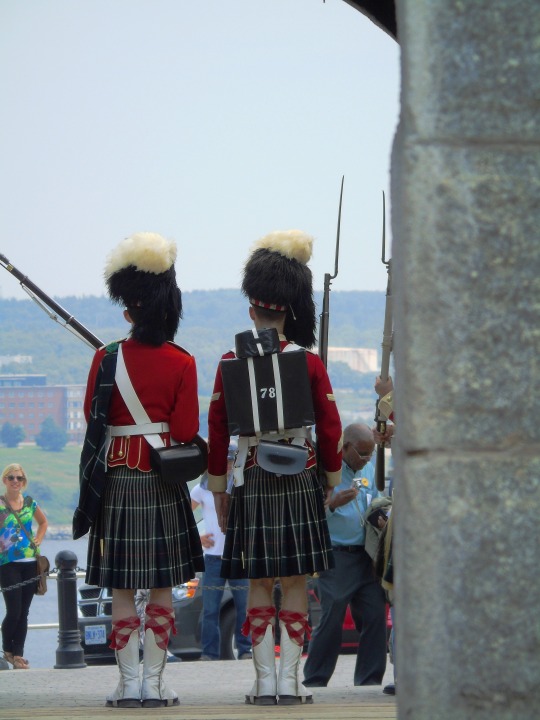
The Halifax riot started on May 8, 1945, when thousands of civilians and servicemen rampage through Halifax.
#Halifax riot#started#8 May 1945#Canadian history#anniversary#travel#Halifax#Nova Scotia#Halifax Town Clock#historic properties#architecture#cityscape#original photography#summer 2015#tourist attraction#landmark#Halifax Citadel National Historic Site of Canada#Fort George#Halifax Boardwalk#St. Paul’s Church#City Hall#street scene#pedestrian zone#vacation
0 notes
Photo

“Maritime Penitentiary Well Managed,” Moncton Daily Times. January 20, 1933. Page 5.
----
Rev. Neil Herman Refers to the Recent Riot and Conditions He Found in the Prison
----
Sackville, N. B., Jan. 19 - Speaking before a crowded congregation last evening in the Main St. Baptist Church, Rev. Neil Herman, of Halifax, during his sermon made the following remarks regarding the recent outbreak in the Mari time Penitentiary at Dorchester.
"The recent riots in our Canadian penitentiaries create opportunities for all sorts of rumors and give rise to nearly any kind of a criticism from those who have been hard hit by the avenging sword of the law.
The vials of wrath are poured upon the wardens and the other officers in charge of our prisons. The wardens always become the target as the captain of a crew of mutineers becomes the hated and maligned object of every sailor in Irons.
Within the last two and a half years I have held two missions in Dorchester Penitentiary. I have been in every corner and crevice of that prison in Dorchester, I have examined the food. I have eaten part of the prison fare. If the food in Dorchester Penitentiary is not fresh, well cooked and wholesome, then my sense of taste must be ridiculously below the standard of ordinary mortals -and so far, I have never been judged either abnormal or subnormal.
If there is a man, who is an eligible judge of sanitation, and, who will take the time to carefully examine the Maritime Penitentiary, and if he can find, in any part of that institution, anything: that can be construed as "filth," he is the first man that I have met who ever ventured such at criticism. The first impression you receive at the penitentiary is that of cleanliness from top to bottom.
Talk about wardens and deputy wardens! If you can produce a superior type of man and officer than that found in Warden G. T. Goad. you can't find him in Canada. You don't need to scour the country for evidence along that line. You can get your witnesses from the inside and that is the side that doesn't lie.
As for Deputy Cummings, he speaks for himself. His brains, in the riot proves his head, and his long record. without a black mark. proves his heart.
As for the other officers - if they were not fit, they wouldn't last twenty-four hours under disciplinarians like Warden Goad and Deputy Warden Cummings. It is an easy matter for the ordinary layman looking on, to say how the job should be done, It is like some fellows thinking they can preach. It is natural for the fellow who is "pinhed" to hurl his curses and his lead pipes at the men in charge of prison walls) and iron bars. In these days of Insurrection and riot we don't want to bite the hand of the law; if we do, the day is not far distant when the hand of bloody revolution will smite us to the dust."
#sackville#dorchester penitentiary#1933 dorchester riot#halifax#sermon#baptist church#prison administration#prison conditions#chaplaincy#warden#deputy warden#convict revolt#prison riot#causes of prison riots#carceral propaganda#great depression in canada#crime and punishment in canada#history of crime and punishment in canada
0 notes
Note
Disrespect for the wip game?
The image of his boy clammed up in Matthew had closed up in the car, shutting him out and raising a wall as easily as he had raised his shoulders to hug himself and get warm. Arthur didn't go to the funerals if skeletons were found in the mud of Flanders, and he wasn't sure why Matthew did. His happiest memories of Marie were far more recent and vivid than that Great War. The First World War had gorged itself on her body and Francis's. The war had played out on their flesh. And it was their bodies he associated it with, yes. His memories were painful and always would be. So were all horrible things. But the worst of it had been softened by bodies he knew, bodies he'd fucked and enjoyed and made love to since. And the generation of men lost had not been his first. The war he knew as well as he made peace.
Jack had lost more of his percentage of people. His jaw still clicked from where it had been shot clean off at Anzac Cove and never healed just so. He limped a little when he was upset, and it was cold from where shrapnel had cut him at Lone Pine. Zee had seen horrors she and Arthur had never been willing or able to put into more words than "I didn't think it would be like that, Dad," and "I know, dear girl," As he held his youngest in a grip like a vice. She'd drowned on a hospital ship and bore scars on her shoulder from Gallipoli. And that was all before they'd made it to France. Jack had never had a temper that lasted before the war. Zee had never had open disrespect. They had never come to shouting matches.
They had been easier to deal with than Matthew. Gilbert complained about his brutality in their brief meetings between the trenches, via Swiss diplomats, and in the rare official communiqué. Arthur looked away from what his boy needed to do in order to meet the expectations placed on him. Matthew had come to him French and damaged, never capable of coherent unity and more than capable of violence. Whatever he did had been his own nature. Whatever about conscription that had snapped him out of place and left him broken was already inherent to the weak nature of the piece of the French empire he had inherited. That's what they had decided a century ago, and that was the end.
And Matthew had agreed he'd come out fine. So what if he'd been gassed first? Everyone has been eventually. If his lungs ached, it wasn't any worse than others. If Halifax had exploded and been erased from the shore, London had been bombed to say nothing of the damage to France and occupied Belgium. Even Alfred had shown up at the end and lost one hundred thousand dead for his contributions, almost twice what Matthew had. From a population over ten times Matthew's but still, twice the loss. And it wasn't as if anyone else had suffered less.
All of them had suffered the results of conscription. A crisis in Australia resulted in him never passing involuntary service. Zee had, but it did little. The riots in Quebec were no worse or better than any other. And unlike the rest, Matthew had gone home to a peaceful world with access to Alfred's deep pockets. He'd been fine. Fine. Just fine.
Send me a word, if it’s in one of my wip documents I’ll answer your ask with the sentence that it appears in
16 notes
·
View notes
Text
Hannah and Chris: [...] Proprietary relations can thus be situated at the heart of the violence exacted on humans, non-humans and land. In Policing Black Lives, notions of property also play a crucial role in the history of Black life in Canada. [...] Robyn describes the ways in which enslaved Black people have continuously resisted their designation as property. In As We Have Always Done, Leanne writes about the relationships of deep reciprocity, interconnection and interdependency [...] emerging from Nishnaabeg thought and practices. Even within radical movements we often see struggles over ownership [...] creep back into the structures, disabling relations of commonality and solidarity. How can we more deeply/generatively refuse to be – or escape the desire to be – owners of others, the world, the self, and instead develop relations of reciprocity when always confronted with, and to some extent living within (or alongside of), societies built on dispossession and continuous propertisation? [...]
Robyn: A political choice has been made and remade, at the level of political leaders [...], to serve the interests of protecting and expanding private property. The logics of accumulation at any cost have come at great expense to human, animal, and other forms of ecological life. [...] [I]t’s crucial, I think, that we remember that regimes of private property – and, crucially, the carceral state that entrenches them – are continually being contested, have never been written in stone, and are far from inevitable or permanent fixtures of planetary and earthly life.
Our cities, the places that we collectively reside in, are also battlegrounds upon which we are trying, continually, to forward new ways to order life. I think one of the starkest examples we can see of this is the struggles being waged over tent encampments inhabited by homeless communities, who in Canada are largely but not solely Black and Indigenous.
In Toronto’s Trinity Bellwoods Park, riot police, drones and air support, in addition to hundreds of regular police and private security and city bylaw officers, were all deployed to “clear-out” the makeshift homes and communities that people had built in in an attempt to eke out safer living during the pandemic and the housing crisis. The cost of this is enormous: the eviction and “remediation” of just three encampments cost over $1.6 million! Elected officials chose, and choose every day, to spend millions of public dollars on criminalizing homelessness rather than address its root causes: the unaffordability of a city caused by the unchecked powers of developers and the mass abandonment of Black, Indigenous, disabled peoples, and people living with mental health issues. This represents the protection of neighborhood property values over the lives of neighborhood encampment residents, and demonstrates the everyday legal violence [...].
But new visions for living are forwarded every day in tent encampments across the country.
Mutual aid encampment support projects like the Encampment Support Networks in Toronto and Hamilton, the Freedom Camp organized outside of City Hall [...], and BLM-Edmonton’s Camp Pekiwewin. As I am writing this our comrades in Halifax are supporting encampment residents against city evictions, ensuring food, water, and medical services where their city has failed to do so. These are all part of a struggle for housing, of course, but they are also struggles over governance, over whether to value human life or the bottom-line of developers and property owners. In city parks across the country, large numbers of people are demanding that we value human life over capitalist accumulation. Here I’d like to bring in the words of Gachi Issa [...], describing the two-week Freedom Camp that she took part in organizing, and the longer-term encampment support organizing that came out of it:
That is one of the most revolutionary things: to build community with people who our government and our society tells us not to: Black, Brown and houseless people standing side by side, to re-imagine what the world could look like.
---
All text above are the words of Robyn Maynard. From: Robyn Maynard, Leanne Betasamosake Simpson, Hannah Voegele, and Christopher Griffin. “Every Day We Must Get Up and Relearn the World: An Interview with Robyn Maynard and Leanne Betasamosake Simpson.” Interfere: Journal for Critical Thought and Radical Politics. 19 November 2021. [Bold emphasis and some paragraph breaks/contractions added by me.]
#tidalectics#debt and debt colonies#opacity and fugitivity#intimacies of four continents#carceral geography#abolition
39 notes
·
View notes
Text
In The Rock 4/22/1980: Over 400 Rowdy April wine fans riot after a sold out show, and being forced to stand in the rain in Halifax - and they trash the Dartmouth Ferry. The next day’s headline “Fists fly, mob screams and April Wine kicks up a din."

0 notes
Text
Events 5.8 (after 1940)
1941 – World War II: The German Luftwaffe launches a bombing raid on Nottingham and Derby.
1942 – World War II: The German 11th Army begins Operation Trappenjagd (Bustard Hunt) and destroys the bridgehead of the three Soviet armies defending the Kerch Peninsula.
1942 – World War II: The Battle of the Coral Sea comes to an end with Imperial Japanese Navy aircraft carrier aircraft attacking and sinking the United States Navy aircraft carrier USS Lexington.
1942 – World War II: Gunners of the Ceylon Garrison Artillery on Horsburgh Island in the Cocos Islands rebel in the Cocos Islands Mutiny. Their mutiny is crushed and three of them are executed, the only British Commonwealth soldiers to be executed for mutiny during the Second World War.
1945 – World War II: The German Instrument of Surrender signed at Berlin-Karlshorst comes into effect.
1945 – End of the Prague uprising, celebrated now as a national holiday in the Czech Republic.
1945 – Hundreds of Algerian civilians are killed by French Army soldiers in the Sétif massacre.
1945 – The Halifax riot starts when thousands of civilians and servicemen rampage through Halifax, Nova Scotia.
1946 – Estonian schoolgirls Aili Jõgi and Ageeda Paavel blow up the Soviet memorial which preceded the Bronze Soldier of Tallinn.
1950 – The Tollund Man was discovered in a peat bog near Silkeborg, Denmark.
1957 – South Vietnamese President Ngo Dinh Diem began a state visit to the United States, his regime's main sponsor.
1963 – South Vietnamese soldiers under the Roman Catholic President Ngo Dinh Diem open fire on Buddhists defying a ban on the flying of the Buddhist flag on Vesak, killing nine and sparking the Buddhist crisis.
1967 – The Philippine province of Davao is split into three: Davao del Norte, Davao del Sur, and Davao Oriental.
1970 – The Beatles release their 12th and final studio album Let It Be.
1972 – Vietnam War: U.S. President Richard Nixon announces his order to place naval mines in major North Vietnamese ports in order to stem the flow of weapons and other goods to that nation.
1973 – A 71-day standoff between federal authorities and the American Indian Movement members occupying the Pine Ridge Reservation at Wounded Knee, South Dakota ends with the surrender of the militants.
1976 – The rollercoaster The New Revolution, the first steel coaster with a vertical loop, opens at Six Flags Magic Mountain.
1978 – The first ascent of Mount Everest without supplemental oxygen, by Reinhold Messner and Peter Habeler.
1980 – The World Health Organization confirms the eradication of smallpox.
1984 – Corporal Denis Lortie enters the Quebec National Assembly and opens fire, killing three people and wounding 13. René Jalbert, Sergeant-at-Arms of the Assembly, succeeds in calming him, for which he will later receive the Cross of Valour.
1984 – The USSR announces a boycott upon the Summer Olympics at Los Angeles, later joined by 14 other countries.
1984 – The Thames Barrier is officially opened, preventing the floodplain of most of Greater London from being flooded except under extreme circumstances.
1987 – The SAS kills eight Provisional Irish Republican Army volunteers and a civilian during an ambush in Loughgall, Northern Ireland.
1988 – A fire at Illinois Bell's Hinsdale Central Office triggers an extended 1AESS network outage once considered to be the "worst telecommunications disaster in US telephone industry history".
1997 – China Southern Airlines Flight 3456 crashes on approach into Bao'an International Airport, killing 35 people.
2019 – British 17-year-old Isabelle Holdaway is reported to be the first patient ever to receive a genetically modified phage therapy to treat a drug-resistant infection.
2021 – A car bomb explodes in front of a school in Kabul, capital city of Afghanistan killing at least 55 people and wounding over 150.
0 notes
Link
[ad_1] Two years ago, Scott Hutchins was on his way to work in Halifax when his bus unexpectedly stopped. He hopped off to find traffic blocked by a commotion in a downtown park — there were police, protesters and the buzz of a chainsaw. It was Aug. 18, 2021, the day a downtown Halifax homeless encampment was razed and a largely peaceful protest took a rough turn. Riot police clashed with more than 100 demonstrators, some of whom were injured, pepper-sprayed and arrested, as city officials cleared out sheds and tents set up outside the old central library on Spring Garden Road.As Hutchins sat recently on a low brick wall next to his backpack, sleeping bag and tent, a message was scrawled in yellow chalk on the sidewalk below: “Aug. 18th. We won’t forget,” it read. “Drop the charges.”The 2021 clash is still fresh in the minds of many. There were criminal charges against protesters, and a review of the police response is underway. But some observers question how much progress has been made confronting Halifax’s homelessness problem. The number of people without a place to call home has grown over the past two years, and tent cities crowd green spaces across the municipality. Story continues below advertisement Hutchins recently became homeless himself and is currently couch-surfing with friends while he works as a mover to save money to buy an RV. “I would say the problem hasn’t gotten any better in Halifax,” he said. “Obviously, I can say that for myself.” Scott Hutchins sits on a low ledge in downtown Halifax with his backpack, sleeping bag and tent in Wednesday Aug. 16, 2023. He recalls the scene he saw two years ago, when a homeless encampment was razed, and a largely peaceful protest took a rough turn. THE CANADIAN PRESS/Marlo Glass Asaf Rashid represented 19 people who after the protest faced charges including resisting arrest, obstruction and assaulting peace officers. Four cases went to trial, Rashid said, but for most of his clients, the charges were dropped.Rashid describes the events of the day as “horrifying,” as his clients witnessed “the force used against people who had nowhere to live, to remove them from the only place they had left.”Protesters were hit with bicycles, body-checked to the ground and pepper-sprayed, Rashid says, and some were left with bruises and concussions. An independent civilian review has since been launched, examining the Halifax Regional Police’s conduct during the removal of the encampment. Story continues below advertisement Since Aug. 18, 2021, the municipality has rethought its approach to homelessness, designating a handful of green spaces for encampments and mostly tolerating it when tents pop up in unsanctioned areas, including around city hall, boulevards, parks, lakes and highway underpasses.The tent cities stand out, but they are kept mostly tidy with the tents organized like a quasi-subdivision. Walkers and wheelchairs are sometimes parked nearby. 2:00 Government leaders, officials call on N.S. to do more about rising number of tents Pasmay Paul lives in a small green tent pitched on the grass outside city hall. On a recent weekday afternoon, he watched as tourists took photos of monuments outside the heritage building.After serving time in prison and struggling to find mental health and addictions support in his hometown of Sydney, N.S., Paul can hardly believe his luck. “I can’t believe they let us tent here,” he said, gesturing to the busy downtown street. “I kind of love it, actually.” Story continues below advertisement Paul, 35, moved to the city this month and was shocked to find many of Halifax’s homeless shelters were full, some with waiting lists. A recent survey conducted by the Elizabeth Fry Society found the number of people “living rough” in the Halifax Regional Municipality has doubled since November 2022, currently hovering around 178.A document published by the Halifax Regional Municipality in June said the homeless population had ballooned to its highest level since the deadly 1917 Halifax Explosion flattened entire neighbourhoods. Trending Now Evacuation flights for N.W.T. wildfires to continue into weekend, military to assist Britney Spears’ husband Sam Asghari files for divorce 14 months after marriage Sam Austin, a city councillor for the suburb of Dartmouth, said some things have changed since the municipality’s “poorly thought-out” attempt to clear the encampment in 2021, but not every lesson has been heeded. Austin says the recent closure of an overnight shelter in Dartmouth was “eerily similar” to what happened two years earlier. 2:08 Review moving forward to assess police response during 2021 encampment eviction The shelter at the Christ Church Hall in downtown Dartmouth was funded by the province, Austin says, but the funding ceased in June, though several people were still using the shelter. Story continues below advertisement Like in August 2021, “the province assured the city the homeless people would be given options,” Austin said. Eight people were promised beds in another shelter, but he said the beds never materialized.Instead, some joined sanctioned encampments in downtown Dartmouth and Halifax, and some set up tents on a patch of grass alongside Lake Banook, a popular recreation spot.“There was nothing done for people,” Austin said. “The municipality was handing out tents to people in tears who have nowhere to go. They closed the shelter, and instead people are living on the side of the road in my district.” The city, he said, has “reinvented” its approach to homelessness, but the province has not followed suit.Karla McFarlane, Nova Scotia’s minister of community services, was not made available for an interview. Instead, the department sent a written statement noting the province has opened over 500 “supportive housing units” across the province, designed for people who aren’t able to maintain stable housing on their own.Spokeswoman Christina Deveau said services include mental health and addictions support and access to primary health care.“We know there is more to do, and it will take a focused and sustained commitment to make real change — change that seeks to address the root causes of homelessness,” she said via email. Story continues below advertisement Austin noted the province moved quickly to provide modular homes for people displaced by wildfires earlier this year.“Where is the rapid response to the folks living in parks?” Austin asked. “When we’re in a society as wealthy as ours, it’s a policy choice.”This report by The Canadian Press was first published Aug. 18, 2023. [ad_2]
0 notes
Text

The note reads:
This shawl was given to John Rand of Bradford by Queen Victoria for a brave deed during the riots in that town – He was the only magistrate who dared to read the Riot Act – The situation was so critical that he made his will before doing so.
From the Bradford Museums' collection.
The riots to which the note refers are those organised by the Chartists in Bradford in 1842. The following information is from an article written by Bradford Museums' Assistant Curator, Dr Lauren Padgett (link here).
Chartism was a political movement which was founded in 1836 and peaked from 1838 to 1848 during a time of particular economic depression and poverty. Working-class support for Chartism was fuelled by resentment towards the Corn Laws. The Corn Laws, introduced in 1815, were tariffs and trade restrictions which benefitted domestic producers by blocking cheap imports of corn and other foods. This inflated the cost of living, increasing the price of food at times of shortages, making the lower classes hungrier and the wealthy producers wealthier.
Chartists wanted to introduce a People’s Charter of six key reforms to reform the electoral system and increase working-class political participation, in the hope that they could then repeal the Corn Laws, amongst other things. In June and August 1842, the North of England was particularly suffering from famine and high levels of unemployment so feelings of discontent were running high. Support for the Chartist movement therefore grew and some mass meetings turned into raucous riots in Yorkshire towns like Halifax, Bradford and Cleckheaton.
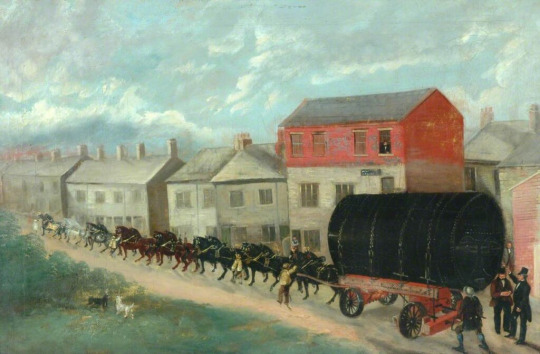
A Mill Boiler Being Transported up a Hill on a Dray.
Artist & date unknown.
The painting is kept in Bradford Museums’ collection.
0 notes
Text
Five steps of Wikipedia for Wednesday, 26th July 2023
Welcome, Välkommen, Velkommen, Bienvenida 🤗
Five steps of Wikipedia from "The Return of the Son" to "2013 Trappes riots". 🪜👣

Start page 👣🏁: The Return of the Son
"The Return of the Son (French: Le Retour du fils) is a Moroccan film directed by Ahmed Boulane and released in 2011. It is Boulane's third feature film and was screened at multiple national film festivals...."
Step 1️⃣ 👣: French language
"French (français [fʁɑ̃sɛ] or langue française [lɑ̃ɡ fʁɑ̃sɛz]) is a Romance language of the Indo-European family. It descended from the Vulgar Latin of the Roman Empire, as did all Romance languages. French evolved from Gallo-Romance, the Latin spoken in Gaul, and more specifically in Northern Gaul...."

Image licensed under CC BY-SA 4.0? by Axtoche
Step 2️⃣ 👣: Académie Française
"The Académie Française (French pronunciation: [akademi fʁɑ̃sɛːz]), also known as the French Academy, is the principal French council for matters pertaining to the French language. The Académie was officially established in 1635 by Cardinal Richelieu, the chief minister to King Louis XIII...."

Image licensed under CC BY-SA 2.0? by Dennis Jarvis from Halifax, Canada
Step 3️⃣ 👣: Alain Finkielkraut
"Alain Luc Finkielkraut (French pronunciation: [alɛ̃ finkɛlˈkʁot], [finkɛlˈkʁaʊ̯t]; Yiddish: [fɪŋkiːlˈkʁaʊ̯t]; born 30 June 1949) is a French philosopher and public intellectual. He has written books and essays on a wide range of topics, many on the ideas of tradition and identitary nonviolence,..."

Image licensed under CC BY-SA 2.0? by Jérémy Barande
Step 4️⃣ 👣: 2005 French riots
"A three-week period of riots took place in the suburbs of Paris and other French cities in October and November 2005. These riots involved youth in violent attacks, and the burning of cars and public buildings. The unrest started on 27 October at Clichy-sous-Bois, where police were investigating a..."

Image licensed under CC BY 2.0? by francois schnell from Strasbourg, france
Step 5️⃣ 👣: 2013 Trappes riots
"Riots broke out in Trappes, a suburb (banlieue) of Paris, France, on 19 July 2013 after the police arrested a man who assaulted a police officer, who tried to check the identity of his wife wearing a Muslim veil on 18 July 2013...."
0 notes
Text







I just noticed I didn’t post for yesterday. We spent the morning enjoying our Airbnb and then headed to the Air Force Museum in Trenton with a real airman! We learned lots, including the fact that Halifax had multi day riots when the German’s surrendered? What’s with that? We had fun hanging with Shaun’s giant puppy Mickey out in Shaun’s backyard and then had an AMAZING, mouth wateringly good BBQ steak dinner that Shaun made for us. Yummy! I also found a quilt guide to the region and from that we decided we’d head out to see the Prince Edward County island to the South of us. It’s where Shaun spent his summers as a kid!
1 note
·
View note
Photo

“DEPLORES "SOB-STUFF”,” Brantford Expositor. February 20, 1933. Page 4.
----
Senator W S Tanner of Halifax, in a flashing attack on "maudlin sentimentality” during the discussion of a resolution in the Senate regarding the management of penitentiaries gave utterance to some remarks that will meet with strong approval from Canadians who love the welfare of their country at heart. After pointing out that prisoners were well treated, that each had a comfortable room, with running water, electric light, a good bed, a library, good food, dietitians, a good hospital, and clean bright surroundings in which to work, he declared that there was too great a tendency on the part of many people in Canada to encourage prisoners by a false sympathy that was ignorant of the true conditions.
This is perfectly true. There is scarcely a crime no matter how heinous committed in this country that does not call forth efforts from these people to secure a reprieve or some commutation of the sentence. Their sympathy seems to be all for the perpetrator of the crime and none whatever for the victims called upon to suffer. Children may be robbed of their fathers, wives of their husbands, happy homes may be destroyed, property stolen and damaged, but the sympathy of this class appears always to go out to those who have committed these desperate crimes.
The rebuke by Senator Tanner was well merited. The people of Canada want prisoners to be treated humanely yet with firm discipline, under surroundings that are calculated to bring about the reformation of their lives, but they do not desire to see crime encouraged by punishment being made a luxury. As a result of the discussion Senator Tanner moved the following resolution which was adopted:
"While the administration of the penitentiaries should be carried on with regard to humanitarian principles, it would be in the public interest that there should be recognition of the fact that prisoners committed to the penitentiaries are properly thus placed in restraint for the purpose of protection of society from such offenders against the laws of the country and as a warning to others."
These sentiments will be approved by right-thinking persons. The present is time to encourage criminals when such gross outrages against the law are being committed all over the Dominion. The Rt. Hon. Arthur Meighen in the course of the debate pointed out that, for the most part, the inmates of penitentiaries included the most desperate criminals in the country and the protection of society demanded that they should be placed under discipline that would teach them respect for the law and regard for the rights of other people, while giving them the opportunity of becoming once more good citizens. It is just as well that these things should be remembered especially by those who are so easily inclined to always take the part of criminals.
#halifax#senate of canada#penal reform#tough on crime#law and order in canada#law and order rhetoric#terror to evilddoers#convict revolt#parliamentary debate#reactionary politics#dominion penitentiaries#great depression in canada#crime and punishment in canada#history of crime and punishment in canada#prison riots
0 notes
Text
Court hears that alleged jail assault ringleader had strong influence on N.S. inmates
A Nova Scotia courtroom heard today that the man accused of leading a brutal Halifax jail assault had allegedly boasted he could set off a jailhouse riot with a single phone call.
Prosecutors are attempting to have Brian James Marriott designated a dangerous offender by demonstrating to a Nova Scotia Supreme Court judge he poses a high risk of committing more violent offences.
Marriott was convicted in 2021 of aggravated assault in the Dec. 2, 2019, beating and stabbing of inmate Stephen Anderson at the Central Nova Scotia Correctional Facility.
Jeffrey Awalt, a training manager for Nova Scotia jails, read today from a report saying that on Aug. 27, 2019, Marriott had to be subdued with large amounts of pepper spray after being told he would be moved to an isolated cell.
Prosecutor Scott Morrison read from a separate report written by another jail officer, who said Marriott told her he could make a phone call and set off "a disturbance" among other inmates.
Nathan Gorham, Marriott's lawyer, told Justice Jamie Campbell that many of the reports read in court rely on second-hand accounts, adding that he intends to challenge their validity.
Gorham told the court he's going to argue that Marriott doesn't pose a risk significantly greater than the risk posed by other inmates and that his client shouldn't be designated a dangerous offender.
This report by The Canadian Press was first published Jan. 17, 2023.
from CTV News - Atlantic https://ift.tt/3y6BqQT
0 notes
Photo










The Halifax riot started on May 8, 1945, when thousands of civilians and servicemen rampage through Halifax.
#St. Paul’s Church#Halifax riot#started#8 May 1945#anniversary#vacation#Canadian history#travel#Halifax Town Clock#City Hall#Historic Properties#cityscape#original photography#architecture#tourist attraction#landmark#summer 2015#façade#street scene#Halifax Boardwalk#WWII#World War Two#World War II#Nova Scotia#Canada
2 notes
·
View notes
Text
"If I discover one more example of stupid wordplay at your hands I will threaten you don't test me"
-Janus
#threatening to threaten people is the single most superior threat ever#an idiot said this#incorrect sanders sides quotes#sanders sides#incorrect sanders sides#quotes from my dnd campaign#janus sanders#also people really hate discovering the fun secrets hidden in the way i name my dnd characters#lloybar halander being from the dm's hatred of bank names and my desire to see if he'd spot that it's just lloyds barclays halifax santander#feckles s disco is from feckless discourse which is made more apparent by his place holder name: reckles s argum#left handid is (i hope) pretty obvious and he has a brother called undair handed which is infinitely funnier#custard ian and bruce forté being custodian and brute force respectively#rio tin is rioting vinnie vogue is just funny and war crimes is a loyal good paladin of redemption with a background as a loyal priest
44 notes
·
View notes
Video
5 notes
·
View notes
Text
Events 3.30 (after 1940)
1940 – Second Sino-Japanese War: Japan declares Nanking capital of a new Chinese puppet government, nominally controlled by Wang Jingwei.
1944 – World War II: Allied bombers conduct their most severe bombing run on Sofia, Bulgaria.
1944 – Out of 795 Lancasters, Halifaxes and Mosquitos sent to attack Nuremberg, 95 bombers do not return, making it the largest RAF Bomber Command loss of the war.
1945 – World War II: Soviet forces invade Austria and capture Vienna. Polish and Soviet forces liberate Danzig.
1949 – Cold War: A riot breaks out in Austurvöllur square in Reykjavík, when Iceland joins NATO.
1959 – Tenzin Gyatso, the 14th Dalai Lama, flees Tibet for India.
1961 – The Single Convention on Narcotic Drugs is signed in New York City.
1965 – Vietnam War: A car bomb explodes in front of the United States Embassy, Saigon, killing 22 and wounding 183 others.
1967 – Delta Air Lines Flight 9877 crashes at Louis Armstrong New Orleans International Airport, killing 19.
1972 – Vietnam War: The Easter Offensive begins after North Vietnamese forces cross into the Demilitarized Zone (DMZ) of South Vietnam.
1976 – Israeli-Palestinian conflict: in the first organized response against Israeli policies by a Palestinian collective since 1948, Palestinians create the first Land Day.
1979 – Airey Neave, a British Member of Parliament (MP), is killed by a car bomb as he exits the Palace of Westminster. The Irish National Liberation Army claims responsibility.
1981 – U.S. President Ronald Reagan is shot in the chest outside a Washington, D.C., hotel by John Hinckley Jr.; three others are wounded in the same incident.
1982 – Space Shuttle program: STS-3 mission is completed with the landing of Columbia at White Sands Missile Range, New Mexico.
2002 – The 2002 Lyon car attack takes place.
2006 – Cyclone Glenda, one of the strongest tropical cyclones in the Australian region makes landfall near Onslow, Western Australia.
2008 – Drolma Kyi arrested by Chinese authorities.
2009 – Twelve gunmen attack the Manawan Police Academy in Lahore, Pakistan.
2011 – Min Aung Hlaing is appointed as the Commander-in-Chief of Myanmar's armed forces.
2017 – SpaceX conducts the world's first reflight of an orbital class rocket.
2018 – The Israeli Army kills 17 Palestinians and wounds 1,400 in Gaza during Land Day protests.
2019 – Pope Francis visits Morocco.
2023 – Donald Trump becomes the first former United States president to be indicted by a grand jury.
0 notes